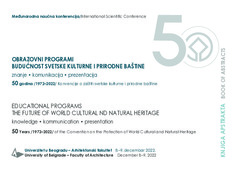Приказ основних података о документу
World Heritage and the Concept of Environment – Ethical and Aesthetic Perspectives
| dc.creator | Kuletin Ćulafić, Irena | |
| dc.date.accessioned | 2023-12-18T12:50:23Z | |
| dc.date.available | 2023-12-18T12:50:23Z | |
| dc.date.issued | 2022 | |
| dc.identifier.isbn | 978-86-7924-318-8 | |
| dc.identifier.uri | https://raf.arh.bg.ac.rs/handle/123456789/1883 | |
| dc.description.abstract | Potreba za integrativnim odnosom u zaštiti i očuvanju nasleđa sagledana kroz koncept održivog razvoja postavila je čoveka, prirodu, kulturu i društvo kroz pojam okruženja u celovit odnos u kom se svaka kategorija svetskog nasleđa (kulturnog: spomenici, spomeničke celine, spomenička područja i kulturni predeli; i prirodnog: spomenici prirode, geološke i fiziografske formacije i znamenita mesta prirode) razmatra kroz sintezu materijalnih i nematerijalnih vrednosti, pri čemu održivi razvoj predstavlja objedinjujuću paradigmu etičkog i estetskog pristupa u shvatanju nauke o nasleđu. Pojam okruženja nije samo scenografija za neku od kategorija nasleđa, već ono sadrži etičke i estetske vrednosti koje ga svrstavaju u svetsku baštinu. U radu se posebno skreće pažnja na složene veze koje vladaju između materijalnog (fizičkog) i nematerijalnog („živog“, dinamičkog) nasleđa. Arhitektonska baština je podjednako materijalna i nematerijalna, pri čemu estetsko iskustvo arhitekture predstavlja ključnu tačku održivog pristupanasleđu viđenog kroz jačanje aktivnosti kulturnog turizma, trasiranja kulturnih ruta, uključivanja lokalne zajednice, unapređenja kreativnih industrija, održivog ekonomskog razvoja, i dr. u cilju aktivnog i produktivnog očuvanja materijalnog i nematerijalnog nasleđa sveta. Sa druge strane etika otvara pitanja dobre volje i slobode, probleme dužnosti i svrhe, odnos moralnog u odnosu na djelovanje u okruženju svetske baštine. Sve navedeno ukazuje na neophodnost u preispitivanju politka o očuvanju nasleđa imajući u vidu izrazite uticaje i posledice savremenog doba. | sr |
| dc.description.abstract | The need for an integrative relation in the protection and preservation of heritage viewed through the concept of sustainable development has placed man, nature, culture and society through the concept of the environment in a comprehensive relationship in which each category of world heritage (cultural and natural) is considered through the synthesis of material and immaterial values, whereby sustainable development represents a unifying paradigm of ethical and aesthetic approach in understanding the science of heritage. The concept of environment is not just a scenography for one of the categories of heritage, but it contains ethical and aesthetic values that classify it as a world heritage. the paper draws special attention to the complex relationships between material (physical) and immaterial (“living”, dynamic) heritage. Architectural heritage is equally material and immaterial, where the aesthetic experience of architecture is a key point of sustainable access to heritage seen through the strengthening of cultural tourism activities, tracing cultural routes, involvement of the local community, improvement of creative industries, sustainable economic development, etc. In order to actively and productively preserve the tangible and intangible heritage of the world. On the other hand, ethics opens up issues of goodwill and freedom, problems of duty and purpose, the relationship between morals and actions in the world heritage environment. all of the above points to the necessity of re-examining the heritage preservation policy, bearing in mind the distinct influences and consequences of the modern era. | sr |
| dc.language.iso | sr | sr |
| dc.language.iso | en | sr |
| dc.publisher | Beograd : Univerzitet u Beogradu - Arhitektonski fakultet | sr |
| dc.relation | Ministarstvo kulture Republike Srbije | sr |
| dc.rights | openAccess | sr |
| dc.source | Knjiga apstrakata : znanje, komunikacija, prezentacija : 50 godina /1972-2022/ Konvencije o zaštiti svetske kulturne i prirodne baštine = Book of abstracts : knowledge, kommunication, presentation : 50 years /1972–2022/ of the Convention on the protection of world cultural and natural heritage / Međunarodna naučna konferencija Obrazovni programi - budućnost svetske kulturne i prirodne baštine, 8-9. decembar 2022. = International scientific conference Educational programs – the future of world cultural and natural heritage, december 8-9 | sr |
| dc.subject | Svetska baština | sr |
| dc.subject | pojam okruženja/životne sredine | sr |
| dc.subject | etika i estetika održivosti | sr |
| dc.subject | materijalne i nematerijalne vrednosti | sr |
| dc.subject | World heritage | sr |
| dc.subject | the notion of environment | sr |
| dc.subject | ethics and aesthetics of sustainability | sr |
| dc.subject | tangible and intangible values | sr |
| dc.title | World Heritage and the Concept of Environment – Ethical and Aesthetic Perspectives | sr |
| dc.type | conferenceObject | sr |
| dc.rights.license | ARR | sr |
| dcterms.abstract | Кулетин Ћулафић, Ирена; | |
| dc.rights.holder | Univerzitet u Beogradu - Arhitektonski fakultet | sr |
| dc.citation.spage | 65 | |
| dc.citation.epage | 66 | |
| dc.identifier.fulltext | http://raf.arh.bg.ac.rs/bitstream/id/6588/bitstream_6588.pdf | |
| dc.identifier.rcub | https://hdl.handle.net/21.15107/rcub_raf_1883 | |
| dc.type.version | publishedVersion | sr |

